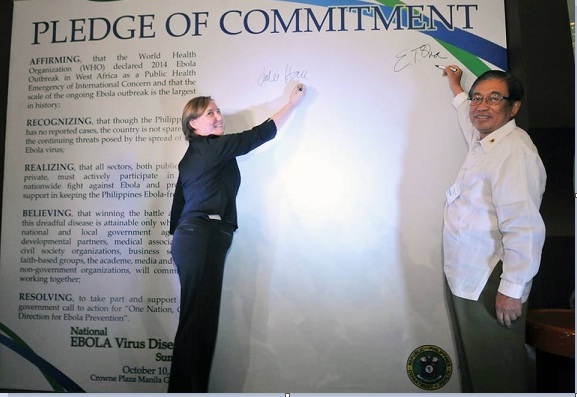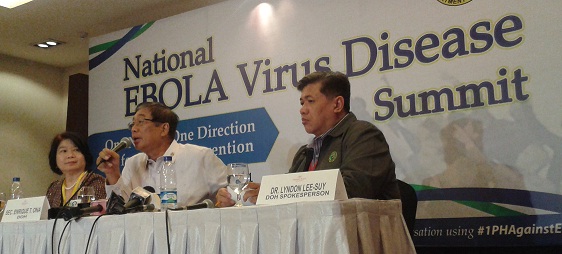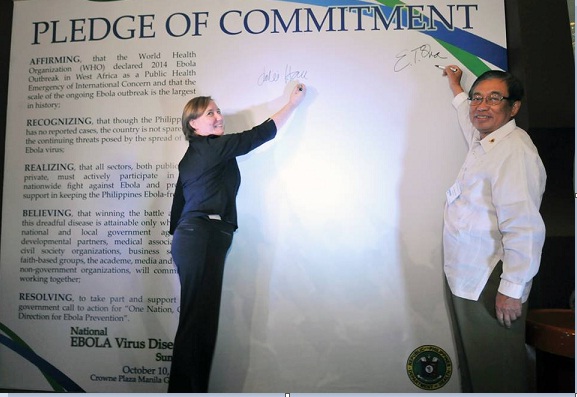
By DIANA G. MENDOZA
EASIER international travel increases the threat of Ebola reaching the Philippines, public health experts warned in an Ebola Virus summit held Friday.
“We cannot afford to be complacent about Ebola, “ warned Health Secretary Enrique Ona even as he assured that “The government has put enough resources to deal with this public health threat.”
The strongest voice in the Ebola Summit held at the Crowne Plaza Hotel in Ortigas Center was Dr. Manuel Dayrit, dean of the Ateneo de Manila University College of Medicine and Public Health, who was the health secretary when the country experienced SARS in 2003.
“Ebola can reach our shores,” Dayrit said. “It’s just a matter of time that it reaches us, given air travel and the fact that we have overseas workers – it’s going to come.” He recalled that in 2003 at the height of the SARS pandemic, there were a few weeks that passed before the first case reached the Philippines. “It actually happened; SARS hit us like a thunderbolt.”
The latest count on Ebola by the World Health Organization puts the total number of confirmed, probable, or suspected cases to 8,399 and the total deaths to 4,033. The numbers were reported from Guinea, Liberia, Nigeria, Senegal, Sierra Leone, Spain and the United States.
Health authorities said the threat of the re-emergence of certain diseases because of international travel and natural occurrences such as disasters and effects of climate change is real as Philippine embassies are directed to constantly monitor the health of Filipinos abroad especially before they return home.
At the Ebola summit convened by the DOH and its medical research arm, the Research Institute for Tropical Medicine (RITM), national preparatory measures were discussed by representatives of government agencies, local government representatives, the academe, and private sector.
Ona narrated that after cases have been noted in West Africa, Spain and the United States, the experience of the US whose first case, a male Liberian national who traveled without symptoms to the US, has died after receiving intensive supportive care and an experimental antiviral drug in a fully equipped and adequately staffed hospital in Dallas, Texas.
With this experience of the US, Ona said “It is important to emphasize that the patient did not receive treatment until several days after he manifested the initial symptoms and this could have contributed to his rapid decline and demise.” He said this tragic example highlights the need to fight this disease and ensure that proper screening and containment measures are in place.

Dayrit said preparing for Ebola psychologically and logistically is going to be very difficult because “it is going to be bigger than SARS.”
Although he said the Philippines has the infrastructure to deal with infections like SARS, there is a need to conduct disease surveillance as any case that occurs in Metro Manila can rapidly go to any part of the Philippines. It would be disastrous if the country’s first Ebola case happens in a local area that has not capability to respond immediately.
Dr. Julie Hall, country representative of the World Health Organization, said this is the first time that the United Nations organized an unprecedented response to a disease outbreak by forming the UN Mission for Ebola Emergency Response (UNMEER) and the second time in UN history that the UN Security Council discussed a health issue; after it convened to take us HIV 25 years ago.
“Ebola is not just a health crisis but a complex emergency,” Hall told the forum. “This is the worst outbreak in history but this is controllable and preventable.”
This is happening as the country is still reeling from the Middle East Respiratory Syndrome- Coronavirus (MERSCoV) that caused the death of a Filipino nurse who worked abroad this year and the death in 2003 of two Filipinos and illness of 14 others from Severe Acute Respiratory Syndrome (SARS), the first pandemic to strike at the turn of the 21st century. Health experts said these diseases, including Influenza A subtypes H1N1 and H5N1, should not be considered history.
